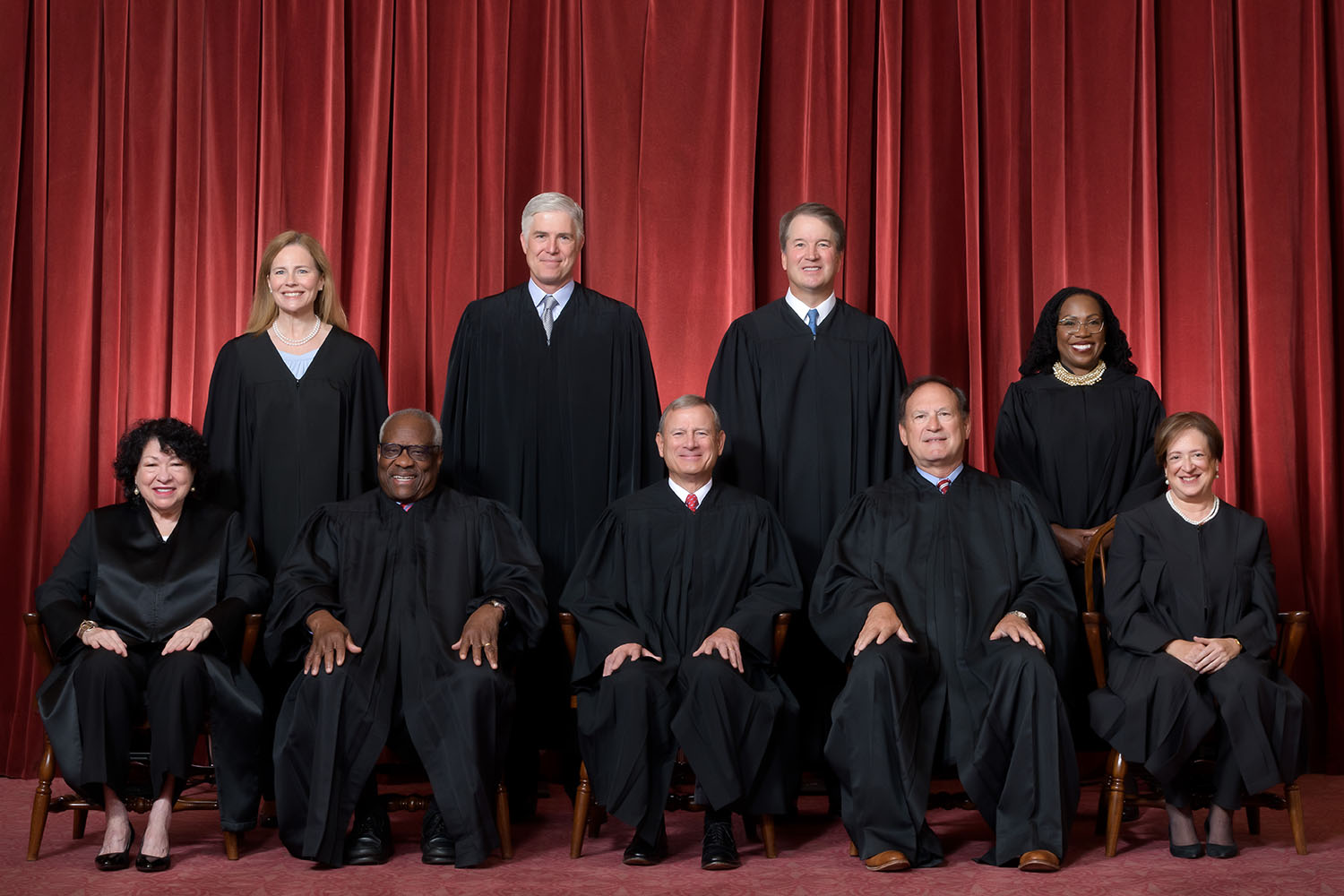Article, news, U.S.
Supreme Court Agrees to Review Trump’s Ballot Eligibility in Landmark Case

Formal group photograph of the Supreme Court as it was been comprised on June 30, 2022 after Justice Ketanji Brown Jackson joined the Court. The Justices are posed in front of red velvet drapes and arranged by seniority, with five seated and four standing. Seated from left are Justices Sonia Sotomayor, Clarence Thomas, Chief Justice John G. Roberts, Jr., and Justices Samuel A. Alito and Elena Kagan. Standing from left are Justices Amy Coney Barrett, Neil M. Gorsuch, Brett M. Kavanaugh, and Ketanji Brown Jackson. Credit: Fred Schilling, Collection of the Supreme Court of the United States
The U.S. Supreme Court has swiftly agreed to hear an appeal by former President Donald Trump challenging a Colorado Supreme Court decision that disqualified him from the state’s Republican primary ballot.
This politically charged case, centered on Trump’s involvement in the January 6, 2021, Capitol attack, holds significant implications for the upcoming 2024 presidential election.
Trump’s Appeal and Its Implications
The appeal revolves around the Colorado Supreme Court’s ruling invoking the U.S. Constitution’s 14th Amendment to disqualify Trump from the primary ballot. Citing the Amendment’s provision, barring anyone engaged in insurrection from holding public office, the state court found Trump ineligible for the presidency.
With the Colorado Republican primary set for March 5, the U.S. Supreme Court has expedited the process, scheduling oral arguments for February 8, emphasizing the time-sensitive nature of the decision. The case’s outcome bears heavy significance for Trump’s presidential ambitions, given his leading position for the Republican nomination.
Noah Bookbinder, president of Citizens for Responsibility and Ethics in Washington, a watchdog group representing the challengers to Trump, added, “We’re glad that the Supreme Court will definitively decide whether Donald Trump can be on the ballot. We look forward to presenting our case and ensuring the Constitution is upheld.”
Legal Battles and Political Ramifications
The Supreme Court’s decision marks a pivotal moment in electoral history. The lower court’s unprecedented application of Section 3 of the 14th Amendment as a basis for disqualification presents an unprecedented challenge to the judicial system.
The case has sparked widespread debate and polarizing opinions. Trump’s spokesperson, Steven Cheung, condemned the disqualification as a part of a “well-funded effort by left-wing political activists” to impede Trump’s reelection.
“The so-called ‘ballot-challenge cases’ are all part of a well-funded effort by left-wing, political activists hell-bent on stopping the lawful reelection of President Trump this November, even if it means disenfranchising voters,” campaign spokesman Steven Cheung said in a statement. “We are confident that the fair-minded Supreme Court will unanimously affirm the civil rights of President Trump, and the voting rights of all Americans.”
Critics argue that holding Trump accountable for insurrection supports democratic values and upholds constitutional principles.
Democrats Looking for Clarence Thomas Recusal
There is mounting pressure from House Democrats for Justice Clarence Thomas to recuse himself in the case.
This pressure arose due to concerns surrounding his wife, Virginia “Ginni” Thomas’ involvement in the January 6 “Stop the Steal” rally and her conservative activism related to the 2020 election results.
Democrats emphasized that her views might influence Justice Thomas’ impartiality, particularly in a case involving Trump’s efforts to challenge the orderly transition of power.
Eight Democratic lawmakers penned a letter to Justice Thomas, asserting that his spouse’s unaltered opinions regarding the 2020 election could impact his judicial objectivity.
Despite these concerns, the plaintiffs’ attorney, Grimsley, mentioned they currently have no intentions to request Justice Thomas’ recusal, citing that no additional information has come to light warranting such a request.
While the possibility of recusal remains open for Justice Thomas and other justices, the Supreme Court has yet to comment on the Democrats’ request.
Former President Trump expressed hope that the three justices he appointed – Neil Gorsuch, Brett Kavanaugh, and Amy Coney Barrett – would ensure fairness in the proceedings. Trump emphasized his efforts in nominating these individuals, lauding their intelligence and character during a campaign event in Sioux Center, Iowa.
Trump also has appealed to a Maine state court a decision by that state’s top election official barring him from the primary ballot under the same constitutional provision at issue in Colorado.
The Oregon Supreme Court will soon decide whether to remove Donald Trump from the state’s 2024 ballots.
Trump prevailed in several states, including Michigan and Minnesota, where top courts threw out similar lawsuits on procedural grounds.
The Supreme Court’s involvement adds complexity, with potential ramifications beyond Colorado’s ballot. The decision could set a precedent influencing ballot access questions in other states, with more than a dozen states considering similar challenges. The judiciary’s resolution will undoubtedly shape the landscape of the 2024 presidential race.

